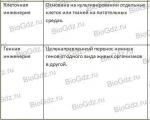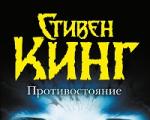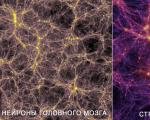28.02.2024
Self-education on the topic of the professional standard of a teacher. Self-education as an incentive to improve the professional skills of a teacher and develop his personality in the context of the implementation of the Federal State Educational Standard. Innovative activities of the teacher
SELF-EDUCATION OF A TEACHER AS A KEY REQUIREMENT
PROFESSIONAL STANDARD
Municipal educational budgetary institution "Gymnasium No. 5",
Orenburg
The trends of modern transformations in society attach particular importance to the process of rethinking the essence and tasks of education and self-education. In the context of the renewal of the political and economic spheres of the country, the reform of government structures, there is a need for new achievements that can only be achieved through the acquisition of education by each individual. In this regard, there is a need for an organization of continuous education that would contribute to the expansion of teacher independence in acquiring knowledge and skills, the formation of their psychological and pedagogical readiness for self-educational activities, and the introduction of experience in improving self-education technologies.
“A teacher learns throughout his life” is a well-known truth. We share the position that after just a few years of work, teachers are divided into those who calmly move along a well-established trajectory, using old techniques, plans, phrases, etc. and prepare students to a certain level, and those who, despite cyclicality, repetition and apparent variety of educational activities are constantly in creative search. This is an important indicator of true professionalism.
Federal Law-273 “On Education in the Russian Federation” states that “state policy and legal regulation of relations in the field of education are based on the following principles: the humanistic nature of education, the priority of human life and health, free development of the individual, education of citizenship, hard work, responsibility, respect for the law, individual rights and freedoms, patriotism, respect for nature and the environment, rational » . The implementation of these principles requires the development of professional competence of a teacher, the most important component of which is the idea of continuity of education.
It is an obvious fact that the knowledge and skills acquired by a teacher during training become insufficient over time to solve new problems facing an educational organization, and this, in turn, presupposes their constant updating and improvement, including through the means of self-education. The ability for self-education is not developed in a teacher along with a diploma from a pedagogical university. Therefore, among the particularly important and pressing problems of education is a comprehensive study of intensifying the process of teacher self-education.
Recent educational regulations place critical emphasis on the teacher's process. The professional standard is a new form of determining the qualifications of an employee in comparison with the unified tariff and qualification directory of works and professions of workers and the unified qualification directory of positions of managers, specialists and employees. The professional standard of a teacher, defining his main labor functions. Labor actions and the required level of knowledge and skills indirectly reveal the risks of the activities and professional development of a modern teacher. This document puts forward a new type of training, focused directly on training a teacher with a creative style of thinking and professional activity, capable of independently determining the directions of his personalized development.
Analysis of psychological and pedagogical sources allows us to assert that self-education is the leading component of professional self-improvement and self-education of a teacher.
The study identified the following approaches to defining the concept of teacher self-education:
– self-education is studied as a continuous, purposeful process, fully or partially organized and regulated by the leadership of an educational institution, determined by the specifics of professional activity and helping to improve its quality (, etc.);
– self-education is interpreted as an independent independent activity of the individual, conditioned by motivation (self-motivation) of professional growth and personal development using a range of educational technologies mastered by the student (, etc.);
– self-education is defined as a system of mental and ideological self-development, entailing personal (volitional and moral) self-improvement, but not setting them as its goal. The main goal of self-education is socially significant professional results, such as improving the qualifications and quality of teaching the discipline (Slavskaya, etc.);
– self-education is considered as the highest level of organization of educational activities, which is characterized by personal motivation for continuous professional and personal self-improvement, activity and independence in setting goals, determining content, constructing and implementing an individual self-education program, determined by the individual’s desire for creative self-development and increased competitiveness (, etc. .).
In the study, by self-education we understand a purposeful, specific way carried out by a teacher to master universal human experience, methodological and special knowledge, professional skills necessary to improve the pedagogical process. Consequently, a teacher’s self-education presupposes systematic and voluntary mental activity, based on the internal need for cognition and implemented in the process of purposeful independent work with the aim of deepening and expanding knowledge, comprehensive development of the intellectual qualities of the individual, and the formation of a scientific worldview. Self-education is the basis for the growth of a teacher as a specialist.
Self-education of a teacher occurs as a result of special, purposeful pedagogical activity, ensuring the development of his self-educational activity and its transformation into self-educational activity.
The desire and experience of self-improvement is a necessary prerequisite for self-education, which involves conscious work on the development of professionally significant personality traits in three directions:
Adapting one’s individual and unique characteristics to the requirements of teaching activities; continuous improvement of professional competence; continuous development of social, moral and other personality traits.
Teaching is a profession with increased moral and social responsibility. The highest demands have always been and will be placed on teachers. What will be the results of the work of teachers today - this will be our society tomorrow. In my opinion, self-education should not be limited to keeping notebooks, writing reports, and creating colorful portfolios. Properly organized work on self-education should become an incentive both for improving the professional skills of the teacher and for the development of his personality. The problem of teacher self-education has become especially relevant in the information society, when access to information and the ability to work with it are key.
The theoretical analysis and pedagogical experience of the author as a geography teacher at the Municipal Educational Institution “Gymnasium No. 5” in Orenburg allow us to assert that a teacher’s self-education will be productive if:
– in the process of self-education, the teacher’s need for his own development and self-development is realized;
– the teacher knows the methods of self-knowledge and self-analysis of teaching experience. The teacher understands both the positive and negative aspects of his professional activity;
– the teacher’s professional development program includes research and search activities;
– the teacher has a developed ability for reflection. Pedagogical reflection is a necessary attribute of a professional teacher;
– the relationship between personal and professional development and self-development is carried out;
– the teacher has a readiness for pedagogical creativity.
Self-education integrates a system of mental and ideological self-education that ensures the volitional and moral self-improvement of the teacher and does not set them as its goal. The constant development of personal creative plans allows the teacher to set an educational task himself and carry it out. However, it is necessary to create a system in which, in addition to training one person, consultations would be held among colleagues of a higher educational institution, scientific supervisors, and subject associations. The need for self-education is dictated, on the one hand, by the specifics of education, its social role, on the other hand, by the real situation of lifelong education, which is associated with the constantly changing conditions of teaching work, the needs of society, the evolution of science and practice, the ever-increasing requirements for a person, his ability to quickly and respond adequately to changing social processes and situations, readiness to rebuild their activities, and quickly solve new, more complex problems.
Self-education involves mastering the technology and culture of mental work, the ability to overcome problems, and independently work on one’s own improvement, including professional development. The basic principles of self-education, according to the statement, include: continuity, purposefulness, integrativeness, unification of general and professional culture, interconnection and continuity, accessibility, proactive nature, constant striving for higher levels, etc.
A teacher’s ability for self-education appears in the process of working with sources of information, analysis and self-analysis of teaching activities. However, this does not mean that only an experienced teacher should and can engage in self-education. The need for self-education can arise at any stage of pedagogical growth, since this is one of the conditions for satisfying the need to establish oneself in the role of a teacher, to take a worthy place in society with the help of the profession. During self-education, a teacher can use various sources of information (studying literature and materials on the Internet, watching TV shows or videos, taking advanced training courses, attending seminars and conferences, attending classes of colleagues with subsequent exchange of experience, studying in a master class, etc. .) and choose the most optimal form of training (individual or group, traditional or distance learning).
focuses in the dissertation research on the need to take into account the individual typological features of the culture of self-educational activity of the teacher, reflecting his motivation for self-education, the direction of self-education (subject, psychological-pedagogical, professional-personal, methodological, educational, etc.), individual teaching style (emotionally improvised , emotional-methodical, reasoning-improvised, reasoning-methodical), type of culture of self-educational activity (formal, qualification, practice-oriented, personality-oriented, creative, research).
Self-education is a logically coherent, clearly planned system of pedagogical work. A teacher, according to A. Disterverg, “is only capable of educating and educating in his work until he works on his own upbringing and education.” If he does not study, does not read, does not follow scientific achievements in his field and does not implement them into practice, it is not enough to say that he lags behind, he pulls back, makes it difficult to solve the problems assigned to the educational institution, and wants or does not want to resist the general movement of the teaching staff. Echoing the “teacher of Russian teachers” - who argued that a teacher lives as long as he studies, one of the outstanding scientists of our time, an academician, addressing young people, wrote: “You always need to study. Until the end of their lives, all the major scientists not only taught, but also studied. If you stop learning, you won’t be able to teach. For knowledge is growing and becoming more complex." Every activity is meaningless if some product is not created as a result. Therefore, it is very important to direct the teacher’s self-educational activities in order to form in him a sustainable need for self-improvement, to create conditions for their practical application in various situations, making the process of self-education more effective. Indicators of the effectiveness of pedagogical self-education are, first of all, the quality of the teacher’s organized educational process and the professional and qualification growth of the teacher. Personal growth training allows the teacher to develop leadership qualities, as well as expand opportunities to achieve their goals. No matter what stage of life and professional path a teacher is at, he will never be able to consider his education completed, or his professional concept finally formed.
Since the process of self-education directly depends on the personal and professional interest of the teacher in improving his skills, in order to manage this process, the school administration must focus on the individual requests of a particular specialist, which is often quite difficult. It is much more effective to provide guidance and control over the self-educational activities of teachers, based on the principles and conditions of the individual-typological approach, which allows division within the teaching team, taking into account the individuality of a particular teacher.
Thus, the teacher’s self-education is carried out only on the basis of deep, promising internal motives that encourage the acquisition of knowledge on one’s own initiative in order to achieve high results in professional activities and personal self-improvement. The increasing importance of teacher self-education, in the context of the concept of lifelong education, is explained by the fact that education as an objective social need becomes an integral component of his life and professional competence.
Bibliography
Antonov self-educational activities // Science and practice of education and. –2015. – No. 2. – P. 20-25. Belokudrina at lessons in // Practice. – 2015. – No. 1. – P. 38-39. Ekenina self-education and self-education of the Deputy Director for Legal Affairs and Security // Science and practice of education and additional education. – 2015. – No. 4. – P. 31-34. Ivanishcheva -andragogical paradigm: content and implementation in the system of higher pedagogical education: monograph /. – M.: VLADOS, 2013. – 184 p. Pomerantsev’s professional development of a teacher // Specialist. – 2013. – No. 10. – P. 34-36. Professional standard “Teacher” (pedagogical activity in preschool, primary general, basic general, secondary general education) (educator, teacher) (approved by the Ministry of Labor and Social Protection of the Russian Federation dated 01.01.01 No. 000n) [Electronic resource]. URL:
Elena Nikiforova
Work experience “Self-education of a teacher in the conditions of the Federal State Educational Standard”
It's no secret that most new knowledge and technologies lose their relevance on average after five years. Having analyzed my knowledge, skills and abilities acquired during my studies at a higher educational institution, advanced training courses, and practical training received experience, came to the conclusion that one of the effective ways to increase pedagogical skill is self-education.
Your way in self-education I started with a professional task set for myself - to bring my level of knowledge closer by self-education, to professional standard teacher. My independent work on self-education began with retraining courses at the Stavropol State pedagogical institute according to the profile « Typhlopedagogy»
in 2013, from advanced training courses at the Stavropol Regional Institute for Educational Development topic: “The effectiveness of the development of preschool organizations at the implementation stage Federal State Educational Standard"2015 Advanced training courses allowed me to delve deeper into development and the use of project activities with children, create an individual program for working with disabled children with whom I worked in 2012-2014, develop a work program for working with preschoolers.
Another one of the forms self-education I use, participation in web planks 2014-2015 topic: “System of psychological support for preschool children” and “Let’s implement GEF DO: artistic and aesthetic development of children", where online I became acquainted with the application of federal state standards, the system of psychological control in other educational institutions, using modern pedagogical technologies. This prompted me to create a personal website, and not just one, but two: Online workers education and on MAAME, since each site offers participation in various competitions, both for teachers, and for children. To contact others teachers and exchange of received information, a personal email was created.
Internet resources have become an active form for me self-education, in November of this year, a demo version of advanced training courses for distance learning from the St. Petersburg Center for Continuing Education was provided on the website of the educational institution, where I listened to and studied topics of interest Topics: for the prevention of the syndrome "emotional burnout teacher»
; on organizing a modern educational space of activity teacher. This information made it possible to fully reassess one’s strengths in preparing for educational activities and organizing an educational space in a group room. The listened video material contributed to a detailed study of the normative bases: Law on Education, Federal State Standards, Professional Standard teacher.
For full self-education work, I wrote a plan work(the structure is attached in a handout, which is compiled annually in accordance with the annual task of the educational institution for the year. The points of the plan indicate the topic planned for self-education, source of information, report format and report deadline. Topics are selected taking into account individual experience. They are always related to the predicted result and are aimed at achieving qualitatively new results. work. For example, one of the topics self-education writing open educational activities on artistic and aesthetic development with elements of gender education by November of this year. Source of preparation for class was: Internet resources, methodological literature, study and Job film studio program (cutting of video material). The form of the report was the outline of the open educational activity itself, and the result of the work done work is the second degree diploma received at the All-Russian competition for teachers on the site"MAAM" and the winner "Golden Fast" competition for teachers. Posting your material on the site, sharing work experience gives me the opportunity to assert oneself as a teacher. Improve your professional level and get paid for your work appropriate assessment in the form of certificates, diplomas, diplomas necessary for further certification.
The plan clearly defines the reporting forms, which have repeatedly been part of pedagogical council. Report forms diverse: here and Job with periodicals (studying articles in magazines, and participation, preparation in seminars, open events for teachers, parents.
From work experience, I can say that the knowledge I acquired on any issue, acquired from one source, was always supplemented by information from another document. It makes me like teacher compare, analyze, draw conclusions and form your own opinion on this issue.
I think that success teacher professional growth depends on him himself, from his elders and experienced work colleagues, head of the institution. Methodical Job required in the institution. Properly organized self-education work, should become an incentive both to improve professional growth teacher, and for the development of his personality.
Publications on the topic:
A teacher development model for increasing the level of competence in the context of the implementation of the Federal State Educational Standard for preschool education
One of the most important areas of activity, in the context of modernization in the education system, is the development of human resources. Not.
Increasing the communicative competence of a teacher in the context of the implementation of the Federal State Educational Standard Workshop for teachers “Increasing the communicative competence of a teacher in the context of the implementation of the Federal State Educational Standard” Purpose: to introduce teachers.
Formation of ICT competence of a teacher in the context of the implementation of the Federal State Educational Standard in preschool education I, like many other preschool teachers, entered the new school year expecting the implementation of the Federal State Standard.
Increasing teacher competence in the context of the introduction of the Federal State Educational Standard in preschool education. Methodological association of educators Topic: Increasing the competence of a teacher in the context of the introduction of the Federal State Educational Standard in preschool education. Goal: to identify the level of professional preparedness.
Self-education of a teacher in the context of the implementation of the Federal State Educational Standard
Terytsa E.G.
Teacher of mathematics and computer science and ICT
I
qualification category
Municipal educational institution "Bendery secondary school No. 13"
Teaching is one of the oldest professions, and the most important thing is that it will never become obsolete. The structure of society may change, political and social structures may become obsolete and disappear into oblivion, technological progress may displace people from all spheres of activity... but!!! No machine will ever replace a real human teacher, no policy will cancel the education of the younger generation by an adult and wise generation of teachers.We live in the 21st century – the century of science and technology. And yet, the goal of the modern teacher remains the eternal goal - to teach to be human. A teacher must be able to break into the souls of students through computers and cell phones.and help live communication between people, teach them to see the beauty of the real world.A modern teacher must have clear and precise answers to the questions: what we teach, why we teach it, how we teach it, and where it can be applied in life.
For pedagogical activity at the current level of society's requirements, it is necessary to constantly update and enrich one's professional potential.Staying professional requires a continuous process of self-education. What is self-education? Self-education is the goal and process of a teacher acquiring knowledge, skills, and methods of activity that allow him to realize his purpose in any way, to solve the tasks facing him in training, education, development, socialization and preservation of the health of schoolchildren.Self-education covers a wide range of issues, but the focus of pedagogical self-education should be turned to the study of such problems, topics, subjects that teachers did not study in pedagogical educational institutions at one time, but which are relevant for modern schools. Among such problems that form the basis of pedagogical self-education, there may be problems of pedagogical communication, individualization and differentiation of training, developmental training, modular training, training in a new type of school, etc. The need for self-education is dictated, on the one hand, by the very specifics of teaching activity, its social role, and on the other hand, by the realities and trends of continuous education associated with the constantly changing conditions of teaching work, the needs of society, the evolution of science and practice, the ever-increasing requirements for a person, his ability to quickly and respond adequately to the changesocial processes and situations. At the present stage, the teacher’s need for self-realization is growing. These are the teachers who are ready to restructure their activities and skillfully solve new, more complex problems.
The self-education of an adult is purely individual, however, it is possible and necessary for the teacher’s self-educational activities to be adjusted by an experienced colleague, an authoritative school leader. In order to provide real assistance to a teacher in organizing self-education, it is necessary to know the needs, requests, and interests of the individual in the field of professional activity. Specially organized methodological work at school should be built taking into account the individual needs of teachers. In this case, the teacher, participating in collective forms of professional development, will find answers to questions that interest him. Self-education is based on a high level of consciousness development, the need for self-improvement and creative self-realization. The self-education of each teacher is built taking into account the culture of mental work and knowledge of the individual characteristics of intellectual activity. The teacher’s self-education depends on him organizing his personal time, drawing up an individual self-education plan and implementing it.
Main directions of the self-education plan:
1) study of new educational technologies aimed at student-centered learning;
2) studying the theoretical foundations of student-centered learning;
3) study of the theoretical foundations of the system-activity approach to teaching;
4) study of the project method as a way to implement a system-activity approach;
5) application of acquired theoretical knowledge in practice.
The teacher draws up a plan for implementing these areas independently.
What are the expected results?
Improving the quality of the taught subject;
Conducting open lessons for school and city teachers;
Increasing the number of participants and winners of Olympiads and mathematical clubs;
Reports and speeches;
Development and delivery of lessons on innovative technologies;
Development and testing of didactic materials, tests, visual aids, creation of electronic sets of pedagogical developments;
Generalization of experience on the topic under study;
Reports, speeches at meetings of the ShMO and GMO, exchange of experience.
The problem of self-education of teachers has become especially urgent in the conditions of the information society, where access to information and the ability to work with it are key:
Study of regulatory documents.
Internet resources for organizing educational activities.
Studying psychological issues within the Internet environment.
Teacher participation in online creative groups.
Participation in online professional competitions and forums.
Studying issues related to organizing student activities.
Participation in webinars.
Creating a teacher or class teacher block.
Student participation in online formats.
Since the management strategy of Pridnestrovian education is focused on Russia, we are studying with special attention the experience of Russians in the field of educational reform. Modernization of the education system is the requirement of the time. State policy must take into account the characteristics of the region and long-term goals for the development of society.The modern concept of continuous pedagogical education in Russia is focused on the developing needs of the individual, society, and state; expansion of the educational space for modern teachers.
Thus, only a teacher who is constantly striving for self-development and self-realization can be called a “teacher of a new formation.”
Literature
Speech on the topic: “Self-education of a teacher in the context of the implementation of the Federal State Educational Standard”
- Dear colleagues!
I am very pleased to see you at our school today. I look forward to your cooperation and active intellectual activity.
Let me start with this parable.
One day, the king decided to put all his courtiers to the test in order to find out which of them was capable of occupying an important government post in his kingdom. A crowd of strong and wise men surrounded him.
“My subjects,” the king addressed them, “I have a difficult task for you, and I would like to know who can solve it.” He led those present to a huge door lock, such a huge one that no one had ever seen. “This is the largest and heaviest castle that has ever been in my kingdom. Which one of you can open it? - asked the king.
Some courtiers only shook their heads negatively. Others, who were considered wise, began to look at the lock, but soon admitted that they could not open it. Only one approached the castle.
He began to carefully examine and feel it, then tried to move it in various ways and finally pulled it with one jerk. Lo and behold, the lock opened! It just wasn't fully latched. Then the king announced: “You will get the best place at court, because you rely not only on what you see and hear, but you rely on your own strength and are not afraid to try.
How do you think this parable relates to the topic of the seminar?
Today we invite everyone to a conversation who, having received a diploma, crossed the school threshold and tried on the costume of a strict teacher, put an ellipsis instead of a dot on their further education. We live in the age of information technology, when deep and rapid changes are taking place in society, and therefore society always places the highest demands on teachers.
The modernization of modern education and the implementation of OOPE is aimed at the construction and implementation of an individual educational route, the self-education of a person at various stages of his life path.
The modern concept of continuing teacher education in Russia is focused on:
Developing needs of the individual, society, state;
Expanding the educational space for modern teachers;
To carry out his mission, a teacher must have a readiness to solve professional problems, that is, a level of professional competence.
One of the indicators of a teacher’s professional competence is his ability to self-educate, which manifests itself in dissatisfaction, awareness of the imperfections of the current state of the educational process and the desire for growth and self-improvement.
















